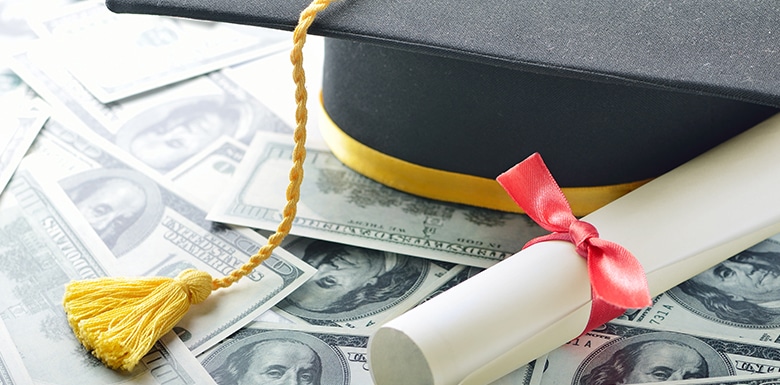Get Your 100% Free
Debt Relief Consult
Is Student Loan Discharge in Bankruptcy Possible?

You’ve probably resigned yourself to paying your student loans for decades. No matter how bad your financial situation, you know they aren’t going away. Bankruptcy can help with a credit card, medical, mortgage, and other debts, but not with student loans. Historically, private and federal student loans can’t be canceled by bankruptcy.
That could all be changing, though. A few court decisions have recently made it clear that there are some scenarios where you can get your student loans discharged through bankruptcy.
If you’ve contemplated filing for bankruptcy, talk with an Ohio student loan lawyer at Luftman, Heck & Associates. We’ll talk with you about your circumstances, including your current income, amount of debt, and types of debt, and explain your options.
To schedule a free consultation, use our online form or give us a call at (888) 726-3181.
Hurdles To Student Loan Discharge
Most people think they can’t cancel student loans in bankruptcy, but that isn’t entirely true. It’s possible, but extremely hard, to achieve. It helps to work with an experienced lawyer and prepare for the high standards you have to meet before a court approves a student loan discharge.
Proving Undue Hardship of Student Loans
To get rid of student loan debt during bankruptcy, you have to prove it would be an undue hardship to repay. What’s an undue hardship? It means it’s tough, if not impossible, for you to repay the loans.
The bankruptcy court will probably use the Brunner test:
- The monthly payment makes it impossible for you and your dependents to have a minimal standard of living
- You won’t earn enough money to make your monthly payment because of your circumstances
- You’ve tried in good faith to make your loan payments or negotiate lower payments
You have to prove each factor by a preponderance of the evidence, which means it is more than likely true. You should talk with an Ohio bankruptcy attorney about how much evidence you need to prove each element. You should also ask about the types of facts that work against you.
Private vs. Federal Student Loans
If you have private loans, it might be easier to pass the test. That’s because you can’t always arrange for lower payments. If you’re in a position where you can’t pay much, or anything, toward your private loans, you might pass the Brunner test.
It’s harder to pass the test if you have federal student loans. There are many repayment options for borrowers, some of which let you pay little-to-nothing for a time. If your circumstances change, such as becoming unemployed or disabled, you can have your payment plan recalculated.
What Are the Litigation Costs
If you want to try to get your student loans canceled, you have to start an adversary proceeding during bankruptcy. It’s during this process that you present facts to prove undue hardship. It’s an additional legal process that you’ll need a lawyer for, which increases the cost of your bankruptcy case.
Can You Get Student Loans Discharged?
Some situations lead to student loan cancellation more often than others.
Disability
The most likely scenario is if you’re disabled and unable to work. We know life has a way of throwing curveballs. You may have become disabled since getting your degree. Despite maybe working in the past, you can’t work now. Or what you can do doesn’t pay enough to cover all your bills. The fact that disabilities often come with high medical costs doesn’t help.
Closed Schools
More than one institution has closed in recent years. If you aren’t able to finish your coursework through another program, you might be able to get your federal loans discharged. This has been more common with for-profit colleges.
Fraud
You might have student loan debt because of fraud or misrepresentations by a college. Your college might have falsely certified you to be eligible for student loans. Or your college might have signed your loan application or promissory note without your permission. A college might have signed for a check or electronic funds transfer, but you never received the money.
Basically, if you have debt that you shouldn’t have been allowed to receive, or didn’t sign up for, talk with a student loan lawyer immediately.
New Legislation Might Help
In December 2020, Senator Elizabeth Warren and others introduced the Consumer Bankruptcy Reform Act of 2020, which would allow courts to discharge student loans. The bill would make a simple but powerful change. It would get rid of the part of the Bankruptcy Code that exempts student loans from discharge. Afterward, student loans would be like any other type of debt.
Will the bill become law? We’ll see. Chances of bankruptcy reform are higher now that Joe Biden is president and Democrats control the House and Senate.
Call a Student Loan Lawyer for Advice
Are you falling behind on your monthly payments? If your debts are too much to handle, reach out to Luftman, Heck & Associates at (888) 726-3181 or through our online form. We’ll walk you through your options in a free consultation, including student loan repayment plans, Chapter 7, and Chapter 13 bankruptcy.
